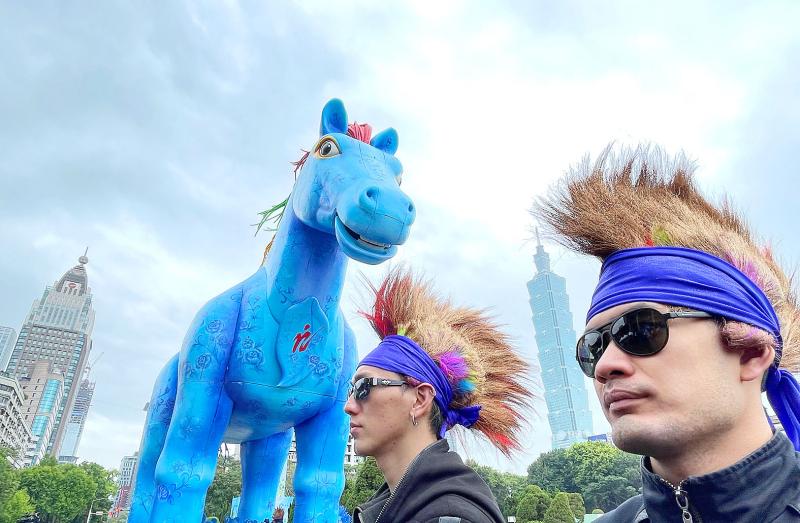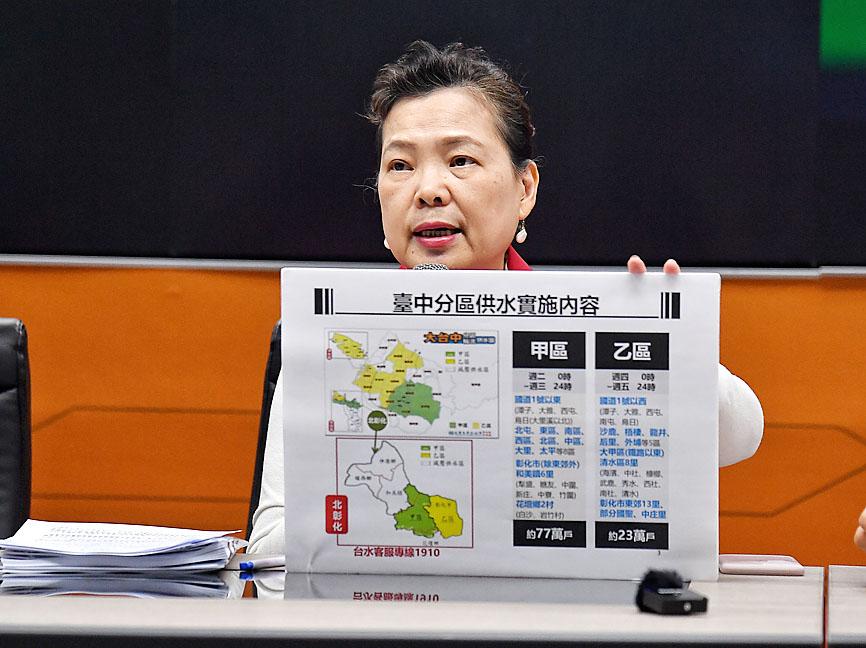Recent rains in central and southern Taiwan have not refilled water reservoirs, prompting the Ministry of Economic Affairs (MOEA) to announce that next month would bring further water restrictions to some parts of the nation.
Some areas of Miaoli County and Taichung are to be placed on “red alert,” meaning that water supplies to households and businesses would be on for five days and off for two days, the ministry said yesterday.
Parts of Changhua County closest to the border of Taichung will be included in the tighter restrictions, the ministry said.

Photo: CNA
However, Hsinchu is to be spared further restrictions thanks to water supplied via the Taoyuan-Hsinchu pipeline, Minister of Economic Affairs Wang Mei-hua (王美花) said.
“The Taoyuan-Hsinchu pipeline brings more than 200,000 tonnes of water per day to the Baoshan Reservoir (寶山水庫) and the nearby Baoshan Second Reservoir (寶二水庫) in Hsinchu County, allowing them to be drawn down much more slowly,” Wang said.
The Baoshan Second Reservoir is just 9.02 percent full, Water Resources Agency data showed.

Photo: CNA
The two reservoirs supply the Hsinchu Science Park (新竹科學園區), home to production facilities operated by Taiwan Semiconductor Manufacturing Co (TSMC, 台積電), United Microelectronics Corp (UMC, 聯電) and other tech companies.
The additional restrictions are to take effect on April 6, following Tomb Sweeping Day.
TSMC said it maintains “contingency plans for each stage of the government’s water restrictions.”
“Some TSMC fabs will slightly increase the percentage of water used from tanker trucks to improve flexibility,” the company said.
“The requirement that we cut water usage by 15 percent starting on April 6 will not affect our operations,” it said, without elaborating.
Some tech production zones in Taichung’s Houli District (后里) have their own dedicated water pipelines, so they would not be affected by the rolling two-day outages, Wang said, adding that such zones would only reduce water use by 15 percent.
Major water users would need to transition from an 11 percent to a 13 percent restriction, while other industrial users would need to follow the same rolling outages as households.
“Most buildings have water towers that hold more than a two-day supply if the water is carefully conserved,” Wang said.
“Similarly, we’ve checked that businesses have water reserves that will last them two days so that production can continue undisrupted,” Wang said. “Other areas that have their own water supplies, such as those with groundwater wells, will be allowed to continuously use those resources.”
The government is hoping that the “plum rains,” which usually start next month, would help to replenish reservoirs, and that Taiwan would have typhoons this year.
Meanwhile, the government has been seeding clouds and digging wells.
“We have to expect the best, but prepare for the worst,” Wang said. “Even if the plum rains don’t bring much rain in May, we can continue living and our businesses can continue producing.”
If the situation remains dire, the restrictions would be tightened, she said, adding that she could not predict the duration of the crisis.
Taiwan was last placed on a “red alert” in 2015 and 2002, Water Resources Agency Deputy Director-General Wang Yi-feng (王藝峰) said.
“The reservoirs are actually at lower levels than they were in either 2015 or 2002,” Wang said. “But thanks to efforts such as the Hsinchu-Taoyuan pipeline, the desalination plant and emergency wells we have managed to hold on for this long before being placed on ‘red alert.’”
Additional reporting by Reuters

CHAOS: Iranians took to the streets playing celebratory music after reports of Khamenei’s death on Saturday, while mourners also gathered in Tehran yesterday Iranian Supreme Leader Ayatollah Ali Khamenei was killed in a major attack on Iran launched by Israel and the US, throwing the future of the Islamic republic into doubt and raising the risk of regional instability. Iranian state television and the state-run IRNA news agency announced the 86-year-old’s death early yesterday. US President Donald Trump said it gave Iranians their “greatest chance” to “take back” their country. The announcements came after a joint US and Israeli aerial bombardment that targeted Iranian military and governmental sites. Trump said the “heavy and pinpoint bombing” would continue through the week or as long

TRUST: The KMT said it respected the US’ timing and considerations, and hoped it would continue to honor its commitments to helping Taiwan bolster its defenses and deterrence US President Donald Trump is delaying a multibillion-dollar arms sale to Taiwan to ensure his visit to Beijing is successful, a New York Times report said. The weapons sales package has stalled in the US Department of State, the report said, citing US officials it did not identify. The White House has told agencies not to push forward ahead of Trump’s meeting with Chinese President Xi Jinping (習近平), it said. The two last month held a phone call to discuss trade and geopolitical flashpoints ahead of the summit. Xi raised the Taiwan issue and urged the US to handle arms sales to

BIG SPENDERS: Foreign investors bought the most Taiwan equities since 2005, signaling confidence that an AI boom would continue to benefit chipmakers Taiwan Semiconductor Manufacturing Co’s (TSMC, 台積電) market capitalization swelled to US$2 trillion for the first time following a 4.25 percent rally in its American depositary receipts (ADR) overnight, putting the world’s biggest contract chipmaker sixth on the list of the world’s biggest companies by market capitalization, just behind Amazon.com Inc. The site CompaniesMarketcap.com ranked TSMC ahead of Saudi Aramco and Meta Platforms Inc. The Taiwanese company’s ADRs on Tuesday surged to US$385.75 on the New York Stock Exchange, as strong demand for artificial intelligence (AI) applications led to chip supply constraints and boost revenue growth to record-breaking levels. Each TSMC ADR represents

State-run CPC Corp, Taiwan (CPC, 台灣中油) yesterday said that it had confirmed on Saturday night with its liquefied natural gas (LNG) and crude oil suppliers that shipments are proceeding as scheduled and that domestic supplies remain unaffected. The CPC yesterday announced the gasoline and diesel prices will rise by NT$0.2 and NT$0.4 per liter, respectively, starting Monday, citing Middle East tensions and blizzards in the eastern United States. CPC also iterated it has been reducing the proportion of crude oil imports from the Middle East and diversifying its supply sources in the past few years in response to geopolitical risks, expanding